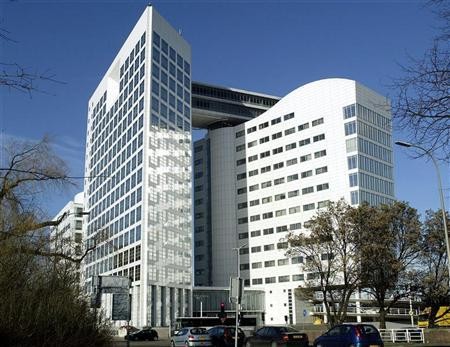http://www.libyaherald.com/icc-moves-one-step-closer-to-admitting-melinda-taylor-culpability/
ICC moves one step closer to admitting Melinda Taylor culpability
By George Grant.
Tripoli, 23 June:
The International Criminal Court (ICC) has said that “appropriate sanctions” would be applied to any of its members found guilty of misconduct, following a visit to The Hague by Libya’s attorney general, Abdelaziz Al-Hassadi, yesterday.
During a meeting with ICC president Sang-Hyun Song and other officials, Al-Hassadi and his delegation presented the court with information that led to the detainment of Melinda Taylor and three other ICC representatives following a visit to Saif Al-Islam Qaddafi in Zintan on 7 June.
The court has never denied the allegations made by the Libyan authorities that Taylor attempted to pass suspect documents to Qaddafi, including letters believed to be from his fugitive right-hand man, Mohammed Ismail.
This is the first time the ICC has publicly acknowledged formally being in receipt of information regarding the incident.
Yesterday, the court said it “attaches great importance to the principle that its staff members, when carrying out their duties, should also respect national laws. The information reported by the Libyan authorities will be fully investigated in accordance with ICC procedures following the return of the four staff members… When the ICC has completed its investigation, the Court will ensure that anyone found responsible for any misconduct will be subject to appropriate sanctions.”
In what seemed close to an apology, the ICC also said it “deeply regrets any events that may have given rise to concerns on the part of the Libyan authorities. In carrying out its functions, the Court has no intention of doing anything that would undermine the national security of Libya”.
Following a visit to Libya earlier this week by the Australian foreign minister, Bob Carr, it was suggested that Taylor and her colleagues could be released in return for a formal apology from the court.
The court also appeared to move closer to agreeing to a Libyan trial of Saif Qaddafi:
“In fulfilling its mandate to end impunity and providing justice to victims, the ICC is ready to assist national authorities with their investigations if requests are submitted to the Court. The ICC is committed to continued mutual cooperation with the Libyan authorities and will do everything it can to assist them.”
During a meeting with ICC president Sang-Hyun Song and other officials, Al-Hassadi and his delegation presented the court with information that led to the detainment of Melinda Taylor and three other ICC representatives following a visit to Saif Al-Islam Qaddafi in Zintan on 7 June.
The court has never denied the allegations made by the Libyan authorities that Taylor attempted to pass suspect documents to Qaddafi, including letters believed to be from his fugitive right-hand man, Mohammed Ismail.
This is the first time the ICC has publicly acknowledged formally being in receipt of information regarding the incident.
Yesterday, the court said it “attaches great importance to the principle that its staff members, when carrying out their duties, should also respect national laws. The information reported by the Libyan authorities will be fully investigated in accordance with ICC procedures following the return of the four staff members… When the ICC has completed its investigation, the Court will ensure that anyone found responsible for any misconduct will be subject to appropriate sanctions.”
In what seemed close to an apology, the ICC also said it “deeply regrets any events that may have given rise to concerns on the part of the Libyan authorities. In carrying out its functions, the Court has no intention of doing anything that would undermine the national security of Libya”.
Following a visit to Libya earlier this week by the Australian foreign minister, Bob Carr, it was suggested that Taylor and her colleagues could be released in return for a formal apology from the court.
The court also appeared to move closer to agreeing to a Libyan trial of Saif Qaddafi:
“In fulfilling its mandate to end impunity and providing justice to victims, the ICC is ready to assist national authorities with their investigations if requests are submitted to the Court. The ICC is committed to continued mutual cooperation with the Libyan authorities and will do everything it can to assist them.”
On 1 June, the ICC postponed its request that Libya hand Saif over to them for trial pending its final determination of Libya’s challenge to the admissibility of the case. The challenge by the Libyan government concerns the ICC’s mandate to try a case only if the state in which it would otherwise be heard has proven itself either unable or unwilling to carry out the investigation or prosecution.
The ICC’s mandate in this regard was not in doubt when the case was first referred to it by the UN Security Council last year, during which time Libya was still ruled by Muammar Qaddafi, who was also wanted by the court.
and.....
http://www.libyaherald.com/banks-charged-libyan-investment-authority-a-fortune-to-lose-a-fortune/
Banks charged Libyan Investment Authority a fortune to lose a fortune
Tripoli, 23 June:
Libya is still struggling to recover catastrophic losses of around $1.75 billion on investments made with leading international financial institutions.
Although Mohsen Derregia, chairman of the Libyan Investment Authority (LIA) since April, said that the failed investments may not have fallen in value as much as feared, the LIA is still looking to seek compensation.
Derregia told Reuters yesterday: “We’ve had losses for around $1.75 billion, of which $900 million was on a single investment with Goldman Sachs. We will have to see how these structured products were created, valued and managed. Then we will talk to the investment house and see if we can claim a refund.” Derregia said it was unclear what kind of structured products were involved.
The most significant losses are from 2007 and 2008 investments in structured products managed by Goldman Sachs and Société Générale. Goldman Sachs structured a $1.2 billion equity and derivatives portfolio for the LIA, which lost 98.5 percent of its value by June 2010. Almost immediately after a rogue trader had lost the bank €5 billion, SocGen’s investment for the Libyan sovereign wealth fund involved a ten year commitment of $1 billion in a derivative, which the French bank used to buy its own shares. The Financial Times reported it had seen documents in which the bank told Mohammed Layas, LIA executive director and Mustafa Zarti, his deputy, that because of the rogue trading losses, the bank, the shares in which had halved in value, was “in play” as a takeover target. No takeover emerged and the investment had lost 72 percent of its value within two years.
Other LIA investments also fell in value whilst racking up high fees. A $300 million investment with BNP Paribas lost around a quarter of its value and generated $18 million in charges. Another $300 million was invested with Millennium Global, a London-based fund set up by a former Goldman Sachs employee, which almost halved in value. Credit Suisse generated fees of $7.6 million for a $200 million investment that depreciated almost 30 percent. An investment of another $300 million with London-based asset manager Permal, brokered by SocGen, had lost 40 percent of its value by July 2010 and incurred charges of $27 million.
One of the challenges facing the LIA in any claim for compensation, and perhaps even damages, will be to prove negligence or bad faith on the part of any or all of the institutions to whom it awarded investment mandates.
There is apparently no shortage of international law firms seeking to work for the LIA, both to support any negligence claims against the likes of Goldman Sachs and SocGen , but also to recover title to Libyan assets, the ownership of which has been diverted to the Qaddafi family and other senior figures within the old regime.
There is also a question of whether the LIA will be running out of time to launch any legal actions. On the face of it, under English tort law for instance, the LIA would have six years from the time the damage was suffered, rather than from when the investment was made. However, a leading lawyer pointed out yesterday that any action would depend on the specific terms of the retainer. He added that there might have been no breach at all and a loss was caused simply by market conditions.


No comments:
Post a Comment